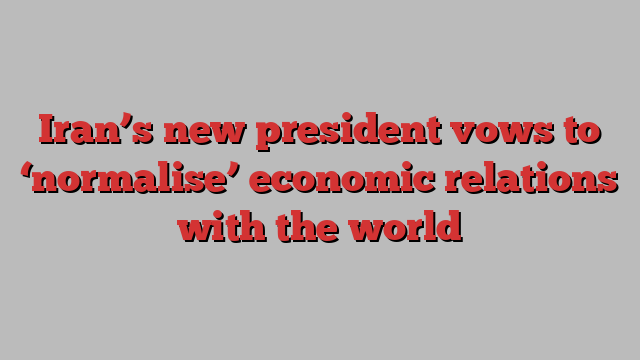
Unlock the Editor’s Digest for free
Roula Khalaf, Editor of the FT, selects her favourite stories in this weekly newsletter.
Iran’s reformist president Masoud Pezeshkian has vowed to “normalise” economic relations with the international community by seeking the removal of US sanctions, in a marked departure from the hardline stance of his predecessor.
“I will not rest until these unjust sanctions are lifted,” Pezeshkian said on Tuesday after being sworn in before parliament. “We want to normalise our economic relations with the world.”
Pezeshkian was the unexpected winner of July’s presidential election run-off when he campaigned with the message that while Iran’s economy could survive under sanctions, it could never thrive.
His predecessor, Ebrahim Raisi, who died in a helicopter crash in May, took the position that economic recovery did not depend on the lifting of sanctions that have caused significant financial strain to ordinary Iranians in recent years.
The Raisi administration did engage in negotiations with global powers, including indirect talks with the US on nuclear and regional issues, but no significant breakthroughs were achieved.
Pezeshkian’s government has yet to detail its new approach, but there are expectations in Iranian political circles that the administration wants to re-engage in nuclear negotiations with world powers.
Analysts have suggested that this could involve Iran offering compromises on its nuclear advancements in exchange for the lifting of US sanctions.
Pezeshkian in his speech declared that his top foreign policy priority would be to strengthen ties with neighbouring countries. He also expressed a readiness to “manage tensions” with the west, without mentioning the US or any other country.
“I call on western states to understand [Iran’s] realities and show mutual respect and equal treatment,” the new president said. But he emphasised that he would not “surrender to bullying, pressure and double standards”, referencing the past two decades of negotiations with Iran.
Western diplomats and some Iranian analysts remain cautious about potential policy shifts, given the historical pattern of Iran’s hardliners undermining reformist efforts, as seen during the presidencies of Mohammad Khatami and Hassan Rouhani.
However, senior reformist politicians argue that the situation was different this time. They believe the Islamic regime is inclined towards pragmatic changes to alleviate economic pressures, which have led to public disillusionment and decreased political engagement.
The next choice of foreign minister could show which direction the country is heading in its foreign policy. Analysts speculate that top nominees include Abbas Araghchi, a seasoned diplomat and a senior nuclear negotiator during the talks that led to the 2015 nuclear accord. Former US president Donald Trump withdrew from the agreement in 2018 and imposed hundreds of tough sanctions on Iran.
On the campaign trail, Pezeshkian criticised hardliners for failing to revive the nuclear accord and for costly measures to evade sanctions, such as selling oil at steep discounts. He also advocated for adopting international standards on money laundering to relax banking restrictions.
Pezeshkian is not expected to challenge the Islamic Republic’s Supreme Leader Ayatollah Ali Khamenei or powerful entities such as the Revolutionary Guard on regional policies and support for anti-Israel militias.
He dedicated substantial portions of his speech on Tuesday to condemning Israel’s war in Gaza, a sentiment echoed by members of parliament who repeatedly interrupted him with chants of “Death to Israel” and “Long live Palestine”.